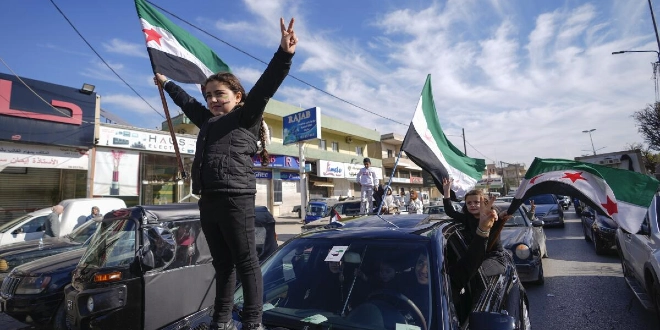Syrians are waking up to a hopeful yet uncertain future after rebels captured the capital, Damascus, and President Bashar al-Assad fled to Russia, ending 13 years of civil war and over 50 years of his family’s rule.
A coalition led by Hayat al-Tahrir al-Sham (HTS), a former al-Qaeda affiliate, made a rapid advance, marking a significant turning point in the Middle East. Assad’s departure eliminates a stronghold for Iranian and Russian influence in the region. Russia has granted asylum to Assad and his family, as confirmed by Russian media and Mikhail Ulyanov, Russia’s ambassador to international organizations in Vienna, on his Telegram channel.
Governments worldwide are responding to the end of Assad’s autocratic regime, assessing the implications for a transformed Middle East. US President Joe Biden stated that Syria now faces risk and uncertainty, with Russia, Iran, and Hezbollah no longer playing dominant roles.
HTS remains designated as a terrorist group by the US, Turkey, and the UN, despite attempts to improve its image to gain international support and reassure Syrian minorities.
Assad’s ouster disrupts Iran’s capacity to arm its allies and could jeopardize Russia’s Mediterranean naval base. It also raises the possibility of millions of refugees, displaced for over a decade in camps across Turkey, Lebanon, and Jordan, returning home.
Now, the rebels face the daunting challenge of rebuilding a war-torn country, needing billions in aid. Ahmed al-Sharaa, known as Abu Mohammad al-Jolani, the head of HTS, spoke to a large crowd at Damascus’ Umayyad Mosque, expressing hope for Syria to become a beacon for the Islamic nation through hard work.
Assad’s prime minister, Mohammed Jalali, expressed readiness to meet with Jolani and facilitate the power transfer. However, he remained uncertain about the Syrian army’s fate, emphasizing the priority of maintaining services for Syrians.
The fall of Assad’s regime, notorious for its brutal political repression, led to the release of political prisoners. Emotional reunions unfolded as newly freed inmates were filmed celebrating their freedom in Damascus streets. The White Helmets dispatched teams to search for remaining underground cells.
With a curfew imposed by the rebels, Damascus was calm, with shops closed and streets mostly empty, populated primarily by armed rebels. Many vehicles bore license plates from Idlib, where the rebel offensive began.
The rebel coalition aims to establish a transitional governing body with executive powers, advocating for a united Syria. Jolani, a Sunni Muslim, leads in a country with diverse religious sects, including Christians and Assad’s Alawites, an offshoot of Shia Islam.
The swift developments stunned international capitals and spurred celebrations among the Syrian diaspora, notably in Sydney, where people paraded, danced, and set off fireworks. However, it also raised concerns about increased regional instability, amid ongoing conflicts such as the Gaza war and tensions between Israel and Iran.
The US Central Command reported numerous airstrikes targeting known Islamic State locations in central Syria. Secretary of Defense Lloyd Austin discussed civilian protection with Turkish Defense Minister Yasar Guler, emphasizing US vigilance.
The civil war, which began in 2011 as an uprising against Assad, saw his forces and Russian allies devastate cities, causing one of the largest refugee crises in modern times. This crisis prompted a political reckoning in Europe when a million refugees arrived in 2015.
Turkey supported rebels in the northwest, while the US backed a Kurdish-led alliance fighting Islamic State jihadists from 2014-2017.
In response to the rebel advance, Israel imposed a curfew on residents of five Syrian towns in the Golan Heights buffer zone, with Prime Minister Benjamin Netanyahu ordering troops to secure the area. He declared that the longstanding disengagement agreement with Syria had collapsed, and Syrian forces had abandoned their positions. Israeli forces deployed to maintain the buffer zone and defend against any threats, asserting they are not interfering in Syria’s internal events.
 The Daily Star Ireland
The Daily Star Ireland

